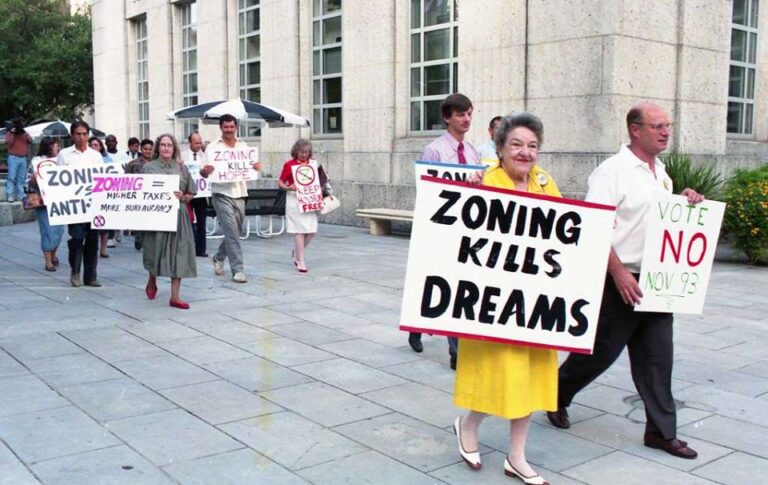Physical Address
304 North Cardinal St.
Dorchester Center, MA 02124
Physical Address
304 North Cardinal St.
Dorchester Center, MA 02124

Two Substacks this week suggest that YIMBYism will or should merge with broader urbanist concerns to become something more like a political party. Two professors aligned with YIMBYism – Chris Elmendorf and David Schleicher – argue that YIMBY needs a broader agenda for “likeable urbanism” (high-quality transit and schools, for instance) to keep winning on housing:
In a new working paper one of us co-authored with David Broockman and Joshua Kalla, we examine the relationship between voters’ support for building more apartments and their feelings toward big cities…
These results imply that durable public support for land-use liberalization in urban areas may depend on increasing the demand for city living, or at least positive affect toward cities.
And a skeptical substacker, Robert Showah, predicts much the same transformation (h/t Megan McArdle):
The likeliest scenario is that YIMBYism further fuses with urbanism. The goalposts will be moved as the argument pivots from the amount of housing to the type of housing: smaller, denser, communal and dependent on walking, biking and public transportation…YIMBY-urbanism may resist acknowledging success for fear it breeds complacency.
Showah is hostile to urbanism and is wrong about a bunch of other stuff. But set that aside – the Elmendorf-Schleicher proposal is exactly what he predicts. And it’s a terrible idea. Not because Showah’s fever dream of nanny-urbanist control of the government is likely, but because a YIMBY Party would be a losing party.
Samuel Hooper gets it right:
It’s not often that you get groups as diverse as Habitat for Humanity, Texas Appleseed, Americans for Prosperity and the Institute for Justice working as part of the same coalition in support of a suite of coordinated, mutually reinforcing zoning reform legislation. This was only possible because we fixated dogmatically on the issues that united us, and avoided distraction by potentially complementary but also divisive peripheral issues…
None of this would have been possible if our Texas statewide housing reform effort had sought to expand its aims by embracing a much broader set of pro-urbanist principles
And it’s not just true in Texas. From Vermont to Florida to Washington and even California, YIMBY policies work when they’re bipartisan. In 2023, Eli Kahn and I wrote:
[M]inority party opposition raises the stakes for politically vulnerable members of the majority party, who will have to defend their vote to their constituents… bipartisanship may be necessary not just as a vote-counting exercise but to prevent defections among the majority party.
Elmendorf and Schleicher aren’t clear on where they expect a party-like YIMBY/urbanism to emerge. The most obvious place is as a faction within the Democratic Party, especially in cities where the Democratic primary is the key election. To a significant extent, that already exists – maybe more formalization would help? But to YIMBY elsewhere, to optimize for blue city primaries would be like donning a Chicago Overcoat.
Alternately (and this sounds closer to some of Elmendorf and Schleicher’s suggestions at the end), YIMBY should be an outside pressure group, endorsing candidates aligned with its goals. That’s….exactly how it works now. And it’s the right approach, with each YIMBY group optimized for the needs, politics, and alignments relevant to its geography.
Nice to see you guys (Marketurbanism.com) are still around. I thought you’d disappeared.
Thanks! The website had a few hiccups in the past year, but Adam has pulled it back up each time.